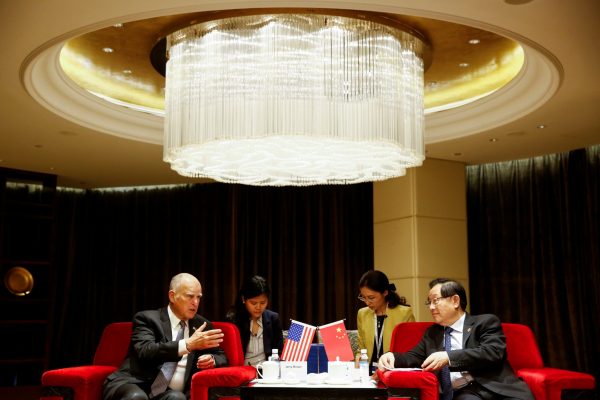He also made a point of announcing the agenda would include discussions on linking California’s nascent carbon market to China’s emissions trading system, which currently covers several provinces and is due to be expanded nation-wide by the end of 2017.
For both China and the United States, this type of sub-national diplomacy broke new ground. By proposing to entirely bypass Washington to pursue California’s climate change goals, Governor Brown significantly raised the stakes for sub-national participation in China’s relationship with the outside world. Yet for China, the United States and other countries, sub-national diplomacy is no substitute for the real thing. In most policy areas, the route to real action still runs through national capitals.
Diplomacy is usually thought of as the preserve of sovereign nation-states. But sub-national entities like states, provinces and cities have long played a notable role on the international stage, especially in promoting economic and cultural exchanges with foreign governments. The most common rationale for such overseas engagement is economic. As both scholars and policymakers frequently observe, globalisation has created unprecedented trade, investment and communications links between sub-national regions and jurisdictions, especially large urban centres.
Such activities mostly fall short of what is commonly thought of as core diplomatic relations. The numerous linkages between sub-national governments in China and Japan, for example, are almost entirely confined to trade promotion and cultural exchange. But lines are becoming increasingly blurred — Brazil’s Sao Paulo State has established formal bilateral relations with several sovereign countries, including the United States, the United Kingdom and France.
Under the Obama administration, US policy embraced sub-national relationships as an extension of traditional diplomacy, particularly with respect to China. The high-level US–China Strategic and Economic Dialogue included a sub-national track, the most visible achievement of which was the creation of the US–China Governors Forum in 2011. The sub-national track has also included a number of bilateral conferences and workshops.
But despite the ambitions of the sub-national cooperation agenda, most concluded agreements have focused on the traditional issue areas of trade, investment and cultural exchange. From China’s perspective, the objectives for engaging in sub-national diplomacy remain primarily economic, particularly to develop better access to large sub-national economic clusters like Chicago and California.
But China’s sub-national relations have increasingly entered the political, as well as economic sphere, with climate change being the best example. Climate change and clean energy has long been a focus of US–China sub-national relations, and China for the most part has welcomed these efforts as a way to enhance existing bilateral cooperation.
In 2013, California signed a landmark cooperative agreement with China’s powerful National Development and Reform Commission focused on clean energy development. In 2015, the US China Climate Leaders Summit — which was intended to help build momentum toward the Paris Agreement on climate change — led to a first-of-its-kind set of mutual agreements between US and Chinese cities to peak or reduce their greenhouse gas emissions. These initiatives added a crucial sub-national dimension to existing bilateral objectives, rather than the other way around.
Governor Brown’s efforts to enhance action on climate change in Beijing, rather than Washington, represents a different and much risker approach — namely to bypass national capitals in pursuit of policy action. This approach is not without merit. In the case of climate change, sub-national activism has played an important role in galvanising support for multilateral action, including the Paris Agreement.
But it is less clear that sub-national diplomacy can achieve substantive policy outcomes. On paper, Governor Brown’s desire to link carbon markets in California and China could dramatically increase the impact of California’s existing climate policy. But in practice, linking markets in different countries is extremely complicated, and previous attempts have produced disappointing results.
For China and the United States, engaging in sub-national diplomacy that is explicitly intended to bypass or get ahead of national policy carries significant risks. While the desire of sub-national leaders to engage directly with their counterparts on issues of mutual concern is both defensible and understandable, it also carries the possibility of undermining bilateral relations.
China likely shares Governor Brown’s intention to enhance bilateral action on climate change, despite the Trump administration’s distaste for it. But it must surely be wary of offending the US administration by dealing directly with the governor of a deeply Democratic state. Likewise for the United States, there remains the risk that China will use the schism between California and Washington to play one side off against the other, and use the divide for propaganda purposes.
Sub-national diplomacy works best when it supports, rather than conflicts with the state-to-state kind. Exchanges, dialogues and cooperative ventures between cities, states and provinces can help build support and momentum for broader objectives, but are generally a poor substitute for traditional foreign policy. For sub-national leaders in the United States, China and other countries wishing to make progress on issues like climate change, they must devote their efforts equally to building relationships within countries as well as between them, and with their own capitals as much as foreign ones.
Scott Moore is a political scientist who studies environmental politics.

